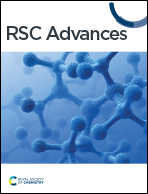Novel ABA block copolymers: preparation, temperature sensitivity, and drug release†
Abstract
A new PEGylated macroiniferter was prepared based on the polycondensation reaction of polyethylene oxide (PEO), methylene diphenyl diisocyanate (MDI), and 1,1,2,2-tetraphenyl-1,2-ethanediol (TPED). The macroiniferter consists of PEO end groups and readily reacts with acrylamides (such as N-isopropylacrylamide, NIPAM) and forms ABA block copolymers (PEO-PNIPAM-PEO). This approach of making amphiphilic ABA block copolymers is robust, versatile, and useful, particularly for the development of polymers for biomedical applications. The resulting amphiphilic PEO-PNIPAM-PEO block copolymers are also temperature sensitive, and their phase transition temperatures are close to human body temperature and therefore they have been applied as drug carriers for cancer treatment. Two PEO-PNIPAM-PEO polymers with different molecular weights were prepared and selected to make temperature-sensitive micelles. As a result of the biocompatibility of these micelles, cell viability tests proved that these micelles have low toxicity toward cancer cells. The resultant polymer micelles were then used as drug carriers to deliver the hydrophobic anticancer drug doxorubicin (DOX), and the results showed that they exhibit significantly higher cumulative drug release efficiency at higher temperatures. Moreover, after loading DOX into the micelles, cellular uptake experiments showed easy uptake and cell viability tests showed that DOX-loaded micelles possess a better therapeutic effect than free DOX at the same dose.



 Please wait while we load your content...
Please wait while we load your content...